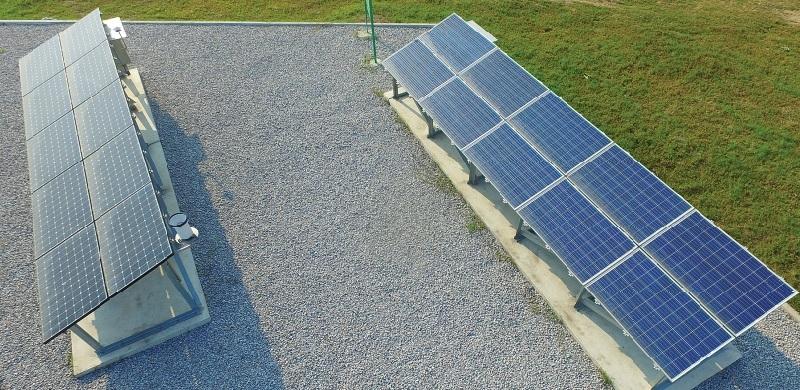DEEP C turns to green growth to develop pioneer eco-park
Deep C Industrial Zones in the northern port city of Haiphong are shaping up to become a next-generation eco-park equipped with state-of-art utilities meeting international standards.

The original development began with Dinh Vu IZ on the Dinh Vu Peninsula in Haiphong. From a deserted area mainly used for fishing, over the past 20 years, the peninsula has turned into a fully-functioning IZ with reliable state-of-the art utility systems. So far, it has attracted $3.7 billion in investment from 84 multinational companies and created more than 10,000 jobs directly and 50,000 indirectly. Both local and foreign businesses investing in Haiphong and the Deep C cluster are thriving. Tenants not only enjoy sustainable industrial development, but also benefit from Deep C’s prime location and good connectivity.
Thanks to the success of Dinh Vu IZ – also known as Deep C I – the company has expanded to the south of Dinh Vu for Deep C II and to Cat Hai Island for Deep C III. This last Deep C installation is located next to Lach Huyen Deep Sea Port, adding another 1,000 hectares of industrial land to Haiphong. The group is also currently expanding its base in the neighbouring province of Quang Ninh to 1,500-plus hectares. Together, all these developments form the Deep C cluster offering more than 3,000ha in the northern region of Vietnam.

Green features are an important part of the Deep C cluster

A met mast monitoring environmental and weather patterns
Rent-A-Port NV, the Belgium-based major investor of Deep C IZs, has made green growth and sustainability a key priority for its development in Vietnam. Therefore, it is making significant investments in waste management, energy efficiency, logistics, and other eco-friendly improvements at its Deep C cluster. It created Deep C Green Energy two years ago. All investors in the IZs are connected to a reliable independent power grid owned and operated by this entity.
The company also aims to integrate renewable energy like wind and solar power. After having installed an initial test module that has been monitored for more than two years, the different Deep C IZs now offer tenants rentable roof surface to install solar energy panels (PV). These panels are patched into the power grid from Deep C Green Energy, allowing tenants a cost reduction without an upfront investment requirement. Currently the company is reviewing possible locations to install first a number of wind mills and ordered a feasibility study to install a small-scale waste-to-energy conversion plant. The output of these renewable energy projects should soon become a full grown third power source for the IZs grid aside from the existing supply of the national (220 kV) and the regional grid (110 kV). The projects underscore Deep C IZs’ commitment to support the national and regional governmental initiatives in Vietnam towards a sustainable and green future.
According to Deep C, improving water and wastewater treatment is another major driver of their sustainability improvement programme. Water-related services at the IZs are provided by its daughter company Deep C Blue. The Deep C cluster, boasting modern water and wastewater treatment facilities, is ideal for manufacturers in the textile, pharmaceutical, chemical, and petro-chemical industries, among others.
Specifically, Deep C Blue can treat 20,000 cubic metres of water a day, with demineralised water, steam, and potable water available on demand. It has a designed daily wastewater treatment capacity of 6,500cu.m, expandable up to 24,000cu.m per day. Deep C Blue offers also on-site wastewater pre-treatment facilities to meet the specific needs of tenants as well as supplying demineralised water, steam, and potable water. Thanks to its constant efforts, Deep C Blue has been recognised as the only one in North Vietnam having an ISO 9001 and 14001 certified wastewater treatment plant. A further step is now being taken to recycle treated waste water into production process consumption, saving water resources and lowering operation costs for investors.
Sticking to its sustainable commitments, the Belgian group has designed its latest Deep C II and III IZs as true eco-parks, with green energy production and supply facilities, clean water produced from available sources of raw water by green power, and all investment projects geared towards offering high-tech advantages and boasting green technology.
“We are the first to take part in Haiphong’s initiative to invest in environmental improvements. The implementation of the eco-park initiative for sustainable IZs is a major goal for us. The current projects are only the start as more initiatives are to be revealed soon. We consider it our duty to show that it is possible to develop IZs sustainably within Vietnam,” said Bruno Jaspaert, general director of the Deep C company cluster. “Together with our partners we also want to start a river-based container service between our inland waterway port concession in Lach Huyen and port facilities in Bac Ninh and Hanoi. Every barge will replace at least 40 trucks, allowing us to offer an environmentally friendly and clean alternative to companies seeking inland transportation.”
The Belgian group ensures that eco-friendly features are incorporated into industrial and social spaces to recycle water and conserve energy, thereby reducing operating costs and improving productivity for tenants. The development of the Deep C cluster into eco-parks is a step forward to realise Rent-A-Port’s aspiration to move sustainability forward in Vietnam. The group is convinced this initiative will also help tenants achieve their social responsibility goals and use resources more efficiently to protect the environment.


